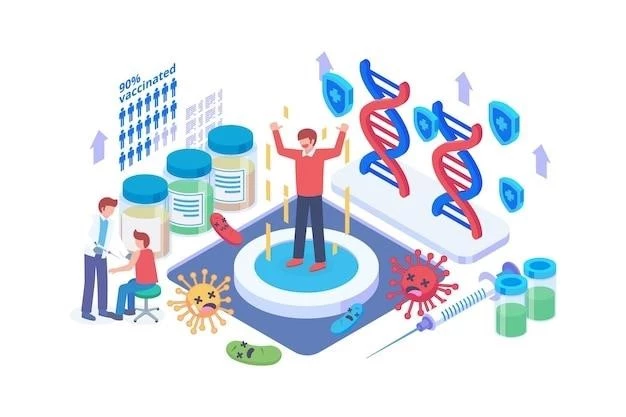Understanding Chromosome Abnormalities is crucial for managing health conditions․ Stay informed and seek genetic testing for personalized care․
Overview of Chromosomes and Their Function
Chromosomes are vital structures in cells that carry genetic information․ Understanding their function is key to grasping how chromosome abnormalities can impact health․ Chromosomes come in pairs‚ with one from each parent‚ and contain genes responsible for traits and characteristics․ They play a crucial role in processes like growth‚ development‚ and reproduction․ Any alterations in chromosome structure or number can lead to genetic disorders․ Learning about chromosomes and their function can help individuals and families better comprehend the implications of chromosomal abnormalities on health․
Genetic Testing for Chromosomal Disorders
Genetic testing for chromosomal disorders is essential for early detection and personalized treatment plans․ Consult with a genetics professional for proper evaluation․
Types of Genetic Testing Available
Genetic testing for chromosomal disorders can include techniques like karyotyping‚ fluorescence in situ hybridization (FISH)‚ chromosomal microarray analysis‚ and next-generation sequencing․ Each type of testing has its own benefits and limitations‚ so it’s important to work closely with a genetic counselor to determine the most appropriate test based on individual needs and circumstances․ Understanding the different types of genetic testing available can help in making informed decisions regarding the management and treatment of chromosomal abnormalities․
Impact of Chromosome Anomalies on Health
Understanding how chromosome anomalies affect health is crucial for proper diagnosis‚ treatment‚ and management of associated conditions․ Seek professional guidance․
Physical and Developmental Effects of Chromosome Abnormalities
Chromosome abnormalities can lead to a wide range of physical and developmental effects‚ such as intellectual disabilities‚ birth defects‚ growth delays‚ and reproductive issues․ Understanding the specific implications of these abnormalities on an individual’s health and well-being is essential for providing targeted care and support․ It is crucial to work closely with healthcare professionals and genetic specialists to create a comprehensive plan that addresses the specific challenges posed by chromosome anomalies․ By being informed about the potential physical and developmental effects‚ individuals and families can better navigate the complexities associated with these conditions and access the necessary resources for optimal management․
Coping with Rare Chromosome Conditions
Dealing with rare chromosome conditions can be challenging․ Seek support from specialists and join communities to gain valuable insights and resources․
Supportive Strategies for Individuals and Families
When facing chromosome abnormalities‚ it’s crucial to seek emotional support and practical guidance․ Joining support groups‚ accessing counseling services‚ and connecting with advocacy organizations can provide valuable resources․ Educate yourself about the condition‚ communicate openly with healthcare providers‚ and prioritize self-care․ Emphasize a team approach involving family members‚ healthcare professionals‚ and support networks to navigate the challenges effectively․ Remember‚ you are not alone in this journey‚ and seeking support is a positive step towards managing chromosome-related conditions․
Latest Research on Chromosome-Related Diseases
Stay informed about the latest advancements in research for chromosome-related diseases to understand treatment options and potential breakthroughs․
Advancements in Understanding and Treatment
Recent advances in research have enhanced our knowledge of chromosome-related diseases‚ leading to improved diagnostic techniques and personalized treatment approaches․ Emerging therapies offer new hope for individuals with chromosomal abnormalities․ Staying updated on these developments can help individuals and families make informed decisions about managing these conditions․ Collaborating with healthcare providers and genetic specialists can ensure access to the latest treatment options and support services․ By engaging with the evolving landscape of research and treatment‚ individuals can empower themselves to better navigate the complexities associated with chromosome-related diseases and optimize their health outcomes․
Support Networks for Individuals with Chromosomal Disorders
Connecting with support networks can provide valuable resources and emotional assistance for individuals and families facing chromosomal disorders․
Connecting with Community Resources
Community resources play a vital role in providing support and information to individuals with chromosomal disorders․ Local clinics‚ advocacy groups‚ online forums‚ and educational seminars can offer valuable guidance and connections․ By reaching out to these resources‚ individuals and families can access tailored assistance‚ connect with others facing similar challenges‚ and stay updated on the latest developments in research and treatment options․ Building a network within the community can strengthen the support system and enhance the overall well-being of those affected by chromosomal disorders․

Management Strategies for Chromosome Abnormalities
Effective management involves a multidisciplinary approach․ Consult genetic specialists and healthcare professionals for tailored care plans and interventions․
Medical and Therapeutic Interventions
Medical and therapeutic interventions are essential for managing chromosome abnormalities․ These may include medications to address specific symptoms‚ physical or occupational therapy to improve quality of life‚ and surgical procedures when necessary․ Working closely with a healthcare team specialized in genetic disorders can help determine the most suitable interventions and treatment strategies․ It’s important to stay proactive in monitoring health‚ attending regular check-ups‚ and following the recommended treatment plans․ By integrating medical and therapeutic interventions‚ individuals with chromosome abnormalities can enhance their overall well-being and optimize their health outcomes․
Future Prospects in Treating Chromosome-Linked Illnesses
Stay hopeful for advancements in treatment․ Engage with specialists and research to explore emerging therapies for chromosome-linked illnesses․
Innovations in Research and Treatment
Ongoing research is driving innovations in both understanding and treating chromosome-related diseases․ Advances in genetic technologies‚ precision medicine approaches‚ and personalized therapies are offering new hope for individuals with these conditions․ Collaborating with research institutions‚ clinical trials‚ and genetic specialists can provide access to cutting-edge treatments and interventions․ Stay informed about the latest breakthroughs and participate in discussions to contribute to the progress in managing chromosome-linked illnesses․ By staying engaged with innovations in research and treatment‚ individuals can be at the forefront of improving outcomes and quality of life for those affected by chromosome abnormalities․
